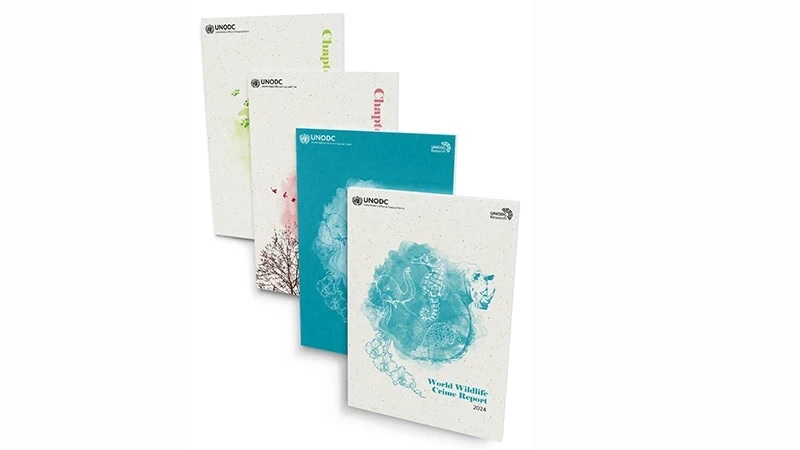Illegal trade in wild animals and plants has persisted, despite efforts made by countries and the international community to prevent it. Despite recording some positive results, in a recently published report,the United Nations Office on Drugs and Crime (UNODC) continued to sound the warning bell that this situation has still affected thousands of animal and plant species and is considered a threat to global biodiversity.

UNODC’s World Wildlife Crime Report stated that the scope and scale of wildlife trafficking activities are still an international concern. (Photo: UNODC)
UNODC’s World Wildlife Crime Report stated that the scope and scale of wildlife trafficking activities are still an international concern.
According to the report, in the 2015-2021 period, this situation occurred in 162 countries and territories, affecting about 4,000 species of animals and plants, of which 3,250 species are included in the Convention on International Trade in Wild Animals, endangered wild animals and plants (CITES). Rhinos, pangolins and elephants are the most targeted animals. Plant species, such as cedar and agarwood are also often targets of smugglers.
According to the report, the sub-Saharan region in Africa is a hotspot for wildlife smuggling. Of the total smuggling cases detected, 19% involved individuals or products from wild animals in this area.
The worrying numbers mentioned above showed the serious impacts of smuggling on wild animal and plant populations in many areas. Furthermore, the illegal trade in wild animals and plants also threatens the stability and recovery of biodiversity and the global ecosystem.
According to a report by UNODC, illegal wildlife trade also causes economic and social problems, leading to other types of crimes, such as money laundering, and corruption, leading to an effect on people's lives.
The UNODC report stated that measures, such as combating illegal trade in certain species, cross-border cooperation and criminalising wildlife crimes, are promoted. Poaching, as well as the falling prices of rhino horn and ivory, over the past decade, are among the fruits of this effort.
Referring to nature conservation policies, the report emphasised the important milestone of the Kunming-Montreal Global Biodiversity Framework, also known as the Biodiversity Plan, adopted at the 15th Conference of the Parties to the Convention on Biological Diversity, in December 2022.
The plan sets an ambitious roadmap with goals, including protecting wildlife, to realise the global vision of a life in harmony with nature by 2050.
Noting achievements in the fight against illegal wildlife trade, UNODC warned that transnational criminal organisations are increasing their activities. These criminal groups have taken advantage of loopholes in national and international laws and regulations; constantly changing tricks and routes to avoid law enforcement agencies.
In the opening statement of the report, UNODC Executive Director Ghada Waly emphasised the importance of raising awareness and strengthening the cooperation of the international community to protect nature's "treasures".
According to her, efforts to destroy transnational criminal organisations require measures on both the supply and demand sides of the smuggling ring, to not only prevent but also reduce the motivation to commit crimes.
Ghada Waly said that this requires appropriate policies, as well as ensuring law enforcement, and more investment in data collection and analysis.
Biodiversity loss has harmed sustainable development and created an uncertain future. This is a warning from United Nations Secretary-General Antonio Guterres, in his message on the International Day of Biological Diversity (May 22).
As the theme of this Day 2024 is “Be part of the Plan”, the UN Secretary-General called for joint cooperation to protect and restore the planet's biodiversity, contributing to creating a more sustainable future for all people.
He expressed that the 16th Conference of the Parties to the Convention on Biological Diversity, scheduled in Colombia later this year, will add impetus to common efforts to reverse the decline while restoring global biodiversity.
Vi An - Translated by NDO
















